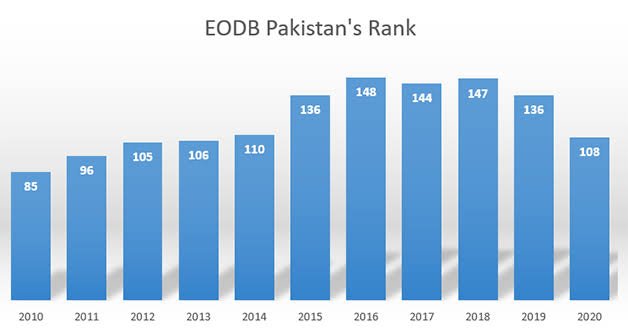Pakistan’s Business Reforms: Rankings Rise, Reality Stalls
Pakistan has been pursuing a series of reforms aimed at making it easier to do business. From digital registration systems to specialized investment councils, officials claim that these measures are reshaping the entrepreneurial landscape. But behind the official numbers lies a more complicated reality. For many small and medium enterprises, reforms remain uneven, selective, and far from transformative.
Islamabad: Prime Minister Muhammad Shehbaz Sharif inaugurates the Business Facilitation Centre. pic.twitter.com/oiiiN4yvOU
— Government of Pakistan (@GovtofPakistan) August 21, 2025
In 2019, Pakistan jumped 28 spots on the World Bank’s Ease of Doing Business index, moving from 136 to 108 out of 190 economies. Government leaders hailed the climb as proof that regulatory hurdles were being dismantled. The World Bank highlighted progress in four key areas: starting a business, dealing with construction permits, getting electricity, and trading across borders.
Since then, initiatives have expanded. The Securities and Exchange Commission of Pakistan (SECP), in collaboration with the Punjab Information Technology Board, introduced an online company registration system. This allows entrepreneurs to apply for incorporation, tax numbers, and social security registrations in one place. In Punjab, a one-stop shop lets firms handle approvals from multiple departments through a single window.
Other steps include abolishing labor department registration fees in some districts, setting up commercial courts to speed up dispute resolution, and introducing insolvency reorganization procedures. In 2023, the government also launched the Special Investment Facilitation Council (SIFC) to coordinate between agencies and attract foreign capital.

Over the years, Pakistan has lagged behind in the ease of doing business index.
Source: State Bank of Pakistan:
Entrepreneurs See Mixed Results
Despite progress, many entrepreneurs argue that reforms are more effective on paper than in practice.
“Registering my business in Lahore took just a few days online, which was a big relief,” said Ahmad Khan, who runs a small IT services startup. “But once you go beyond registration, the same old issues appear. Getting approvals, paying taxes, or dealing with utility providers is still a nightmare.”
This divide is echoed across sectors. Businesses in Punjab benefit most, while entrepreneurs in Sindh and Khyber Pakhtunkhwa report slower uptake. For many, digitization has reduced front-end bureaucracy but not the culture of red tape that follows.
NRRC 2025!
Hear from Mr. Sheikh Waqar Ahmad, CEO, Baby Food & Nutrition Council, as he shares his perspective on how reforms are making it easier for businesses to grow & invest
Watch how Pakistan’s reform narrative is being shaped through meaningful public-private collaboration pic.twitter.com/zAnfxKmI0N— Board of Investment, Pakistan (@investinpak) June 23, 2025
Key Areas of Impact
- Registration Simplified: SECP’s e-services portal has cut the average time for company incorporation from weeks to days. Information is now shared automatically with the tax authority, a change praised by new firms.
- Single-Window Systems: Punjab’s one-stop shop integrates multiple approvals, reducing face-to-face interactions with officials. Early data shows faster turnaround for basic permits.
- Legal Support: Commercial courts in Lahore have processed hundreds of small claims more efficiently than general courts. Experts say this could improve contract enforcement, one of Pakistan’s weakest indicators.
- Digitization of Laws: Business laws are being uploaded online, making them more accessible to investors.
Persistent Challenges
Yet progress remains uneven.
- Unequal Rollout: Punjab has taken the lead, but many reforms have not reached smaller provinces. In Karachi, construction permits still take months. In Quetta, entrepreneurs say online services are barely functional.
- Access to Finance: SMEs remain locked out of credit markets. Banks demand high collateral, and lending to SMEs is only about 7% of total private sector credit, far below regional peers.
- Tax Complexity: Businesses face multiple overlapping taxes. According to the World Bank, firms must make 34 tax payments a year in Pakistan, compared with 10 in India.
- Energy and Infrastructure: Frequent power shortages and costly inputs continue to limit competitiveness. A textile factory owner in Faisalabad said, “Reforms don’t matter when your production shuts down three times a week.”
You May Like To Read: Impact of Illegal Border Markets on National Security and State Revenue of Pakistan
Data Tells the Story
The official record shows both promise and limitation:
| Indicator | 2019 | 2020 | Latest Available |
|---|---|---|---|
| Ease of Doing Business Rank | 136 | 108 | Index discontinued in 2021 |
| New Companies Registered (SECP) | 64,000 | 79,000 | 95,000 (2023) |
| SME Share of Private Credit | ~8% | 7.6% | 7% (2023) |
| Time to Start a Business | 20 days | 6 days | 5–7 days (2024) |
The surge in company registrations signals progress, but stagnant SME credit shows deeper barriers remain.
Expert Views
Economists warn against overreliance on rankings. “Pakistan’s improvement on the index was real, but it reflected targeted reforms, not systemic change,” said Dr. Hafiz Pasha, a former finance minister. “Unless reforms expand beyond registration and tackle taxation, credit, and governance, the impact will stay shallow.”
Others highlight political instability. Frequent changes in policy direction and slow judicial processes discourage both domestic and foreign investment. Pakistan attracted $1.7 billion in foreign direct investment in 2023, far below regional competitors like Vietnam, which secured over $36 billion.
A large share of Pakistan’s economy estimated at 35% remains informal. Many businesses avoid formal registration to escape taxes and compliance requirements. Experts argue that unless reforms address the reasons firms stay informal, improvements will not translate into higher revenues or jobs.
Global Comparisons
Countries like Singapore, the UAE, and Estonia have used integrated digital platforms to cut costs and reduce paperwork. Pakistan has made progress but still lacks full integration. For example, construction permits in Karachi can involve more than 15 separate steps, compared to just 4 in Singapore.
Pakistan’s business reforms have made starting a company easier and created momentum for change. Entrepreneurs in Punjab, in particular, have felt the benefits of digital systems and one-stop shops. But uneven rollout, credit shortages, and regulatory complexity continue to block progress.
The gains in international rankings cannot mask the deeper structural hurdles. For reforms to reshape the entrepreneurial landscape, they must go beyond digitization and address finance, taxation, and energy.
As one Karachi-based garment exporter put it, “It’s easier now to enter the system, but once you’re in, you’re still stuck in the same maze.”
You May Like To Read: Govt Cuts Diesel Prices, Petrol Unchanged for Next Fortnight







